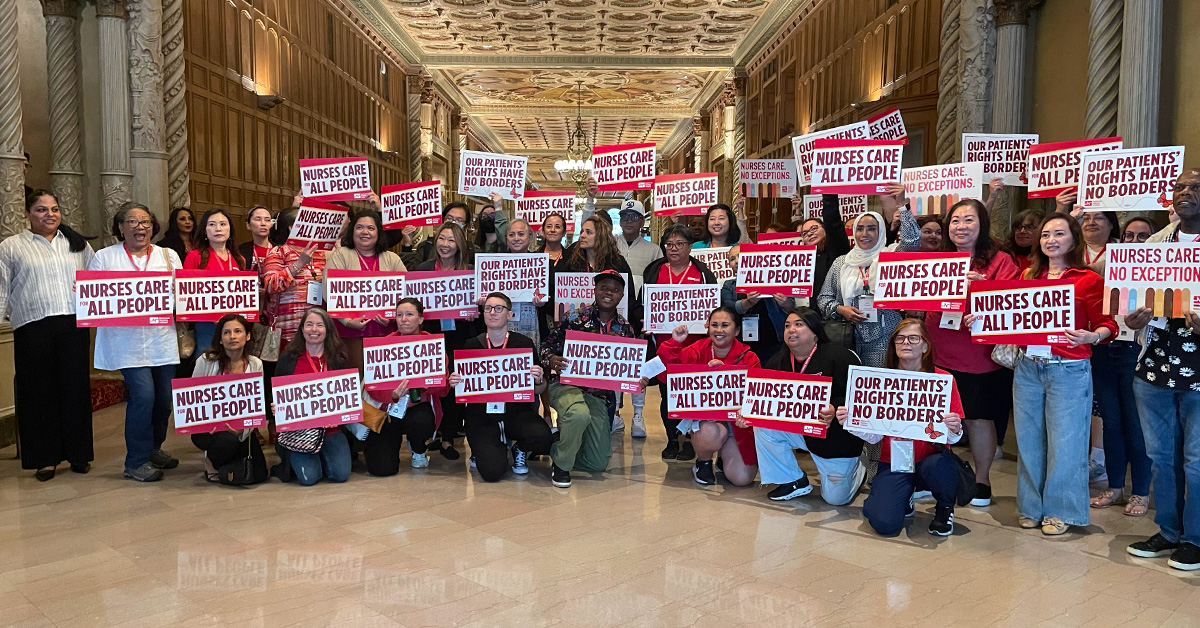Nurses mobilize to oppose ICE presence in facilities

Trainings begin, and new law passed in California
By Lucia Hwang with additional reporting by Kari Jones
National Nurse magazine - July | August | September 2025 Issue
Dianne Sposito didn’t notice the Immigration and Customs Enforcement (ICE) agent at first. As an emergency department nurse on shift June 24 at Ronald Reagan UCLA Medical Center Los Angeles Hospital, Sposito was walking through the main ER waiting room when she saw a woman screaming and throwing herself off the gurney she was on. Sposito immediately grabbed the vital signs machine and rushed toward the woman. She was about to begin triage when a voice commanded, “Don’t touch her.”
Sposito was confused. She needed to assess the patient. That’s when she saw the man wearing a mask, sunglasses, and hat. ICE was there.
Sposito had carefully reviewed flyers issued by her union, California Nurses Association, informing nurses of their rights to protect patients in case ICE showed up at her hospital. She asked the agent’s name, to see his badge, to see if he had a warrant for this woman. She said the agent rudely refused to answer any of her questions, saying “I don’t need to tell you anything.”
Meanwhile, the patient was cuffed to the gurney and continued to cry and yell loudly. The charge nurse eventually connected with a hospital administrator and they took over her care and dealing with the ICE agents.
Sposito was livid. “To me, that patient could have died while that guy was standing in my way. That burnt me up,” she said. “He was interfering with me seeing a patient, interfering with my patient care, which really pissed me off.” She noted that in her 25 years of working in the ED, she has cared for other patients in the custody of law enforcement, but officers had always been fairly polite, respectful, and followed her requests. Not this time.
“This is horrific. This is not okay,” added Sposito. “He was blocking me from taking care of the patient. They were totally inappropriate.”
NNU members in Los Angeles, which so far has been the hardest hit by ICE roundups of Black and brown immigrant workers, and across the United States are fighting back because we agree: Our hospitals, clinics, and all health care settings must remain places of healing and safety, not terror and danger. Nurses and fellow health care providers take care of anyone needing medical help, regardless of immigration status or any other reason. Immigrants are workers who do some of the hardest, most undervalued labor in the United States and nurses stand in solidarity with them. ICE should have no presence in our hospitals. But almost immediately after being sworn into office in January, President Trump rescinded a Biden-era policy that made hospitals, churches, and schools “sensitive” areas that were generally considered off limits for immigration enforcement.
Knowing that hospitals were now a target, NNU began issuing and circulating “Know your rights” flyers throughout member facilities. While most encounters with ICE so far have been when agents bring in people who are having a medical emergency while in the process of being detained, nurses should prepare for other scenarios and the possibility of ICE raiding hospitals to detain patients and workers.
Already, nurses report that immigrant patients are entirely avoiding the hospital, not even for vaccinations, prenatal care, appendicitis. When they do come, they hide from hospital security. One nurse encountered a returning patient who was admitted under a different name because she was afraid of being tracked, but the nurse noted her patient history was therefore incomplete. Nurses are dealing with children who have been traumatized by the kidnappings of their parents or other family members. One public health nurse said a patient with tuberculosis refused to give a list of recent contacts for fear of endangering others. But then no contact tracing could happen.
Since September, NNU has stepped up its activism to protect immigrants from ICE. With the help of staff who are already involved in local efforts to educate and prepare immigrant workers, NNU is holding trainings for RNs to learn what concrete steps they can take if ICE shows up at their facility. One was held in Los Angeles in September, and more are planned for November and December in Oakland, Chicago, and Washington, D.C. Please contact your labor rep to sign up.
NNU has also asked to meet with hospital administrators to make certain demands to protect patients and nurses, have a documented plan for ICE encounters, and secure a commitment backed by policy that it will resist and deter ICE presence at the hospital. In California on Sept. 20, the California Nurses Association successfully sponsored, helped pass, and the governor signed into law a bill that goes into immediate effect, S.B. 81, that requires hospitals to have a response plan for immigration enforcement activity. S.B. 81 additionally establishes place of birth and immigration status as protected health information, beefing up existing patient privacy protections. CNA is now planning with nurse members about how to ensure employers follow the new law.
Sposito agrees nurses must organize to pressure administrators to back up nurses. “We should have a plan,” she concluded. “[ICE] should never interfere with care.”